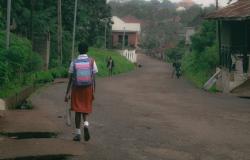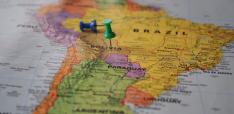How Decolonial and Learner-Centred are the Competency-Based Education Policies in Africa? Reflections on Kenya's Experience

This is the eleventh chapter in a forthcoming e-book, entitled 'Decolonial Education and Youth Aspirations'. Elizabeth Ngutuku examines education policy in Kenya and argues for approaches rooted in African values, philosophies, visions, and needs.
The shift from teacher-oriented and content-based learning to student-centred learning or Competency-based Curriculum has been a steady feature of education systems worldwide in the last few decades. Competency-Based Curriculum (CBC) is a curriculum that provides flexible learning pathways and requires students to demonstrate mastery of complex and transferable learning targets before moving on to new content and stages, or what is seen as competency. Competency means the knowledge, skills, behaviours and attributes needed to perform a task adequately (Evans et al., 2020). In the CBC, the classroom is also seen as a democratic space, where learning is by doing and peer cooperation, with the teacher serving as a scaffolder.
Competency-based Curriculum is also, in some instances, known as Outcome Based Curriculum or Thematic Curriculum. Outcome Based Curriculum is a learner-centred educational approach that is premised on what learners should do successfully as a result of their learning experiences. Each part and aspect of the education system, including the curriculum, learning activities, and assessment, is therefore based on specific goals or results of learning, or what is seen as outcomes. Thematic learning organises learning around a broad, predominant content or theme to provide learners with meaningful experiences. The value of such learning is, therefore, determined by what is essential for learners in that context (Altinyelken, 2010. These forms of learning are contrasted with the content-based Curriculum, which is oriented and where teachers are centres of learning and owners of knowledge (Tarmo and Kimaro, 2021).
In this chapter, I focus on some contestations surrounding the CBC policy in Kenya and similar contexts in Africa, from a decolonial perspective. Decolonial perspectives do not just deconstruct and challenge Western power relations and the reinterpretation of knowing in different contexts. They also honour different ways of knowing and viewing the world, including the perspectives of children.Drawing from my work and research in Kenya (See Ngutuku, 2025), I also engage one of the key features of the CBC curriculum: its preparatory justification, since it is geared towards preparing learners to fit into the changing needs of the global economy, or what is seen as 21st century needs (Gichuru et al. 2021; Schweisfurth, 2013). By showing how aspirations reflect learners' hopes about the future and viewing rights in education as something students actively claim, I offer examples of the alternative aspirations of learners in and through education (Ngutuku, 2022). I also reflect on perspectives on rights in educationfrom an equity and social justice perspective. In bringing these issues together, I conclude by noting that a learner-centred curriculum must focus on learners' perspectives of futures through education, cater for the lived experience of the learners inside and outside the school environment, and should be guided by social justice perspectives.
Setting the Scene: CBC as Policy Transfer
Based on high policy convergence and originating primarily from the West, the Competence-Based Curriculum (CBC) is seen as a travelling policy or an outcome of policy transfer. Education policy transfer is the 'movement of educational ideas, institutions or practices across national borders' (van de Kuilen et al. 2019:66). Levitt and Gardine (2021:3) note that travelling policies are adopted across different sites and are usually shaped by the activity of supra-national and transnational agencies, and by shared educational agendas. In this policy borrowing, CBC is presented not just as a social good but as a global good that ushers learners into the 21st-century economy.
In Africa, several countries have adopted CBC policies. Examples include South Africa, Tanzania, Rwanda, Kenya, Mozambique, Zimbabwe, Zambia, and Uganda (Mulenga & Kabombwe, 2019; Van de Kuilen et al., 2019). CBC education is pitched as a solution to pressing needs not only in education but also in other problems faced by countries. For example, in Uganda, CBC was incorporated into the new Thematic Curriculum in the lower primary classes in 2007, with the aim to address the inefficiencies of the education system, including low achievement in literacy and numeracy skills (Amone, 2014). In South Africa, the Outcome-Based Curriculum, introduced in 1998, targeted the lack of problem-solving and critical thinking skills, as well as the need for a skills-based workforce. It also had an explicit political objective of restructuring South African society along democratic principles (Engelbrecht and Harding, 2008). In Namibia, CBC, introduced in 2005, aimed to democratise society and was seen as a panacea for society's complex problems (Van de Kuilen et al., 2019). In Kenya, CBC played a social engineering role and was presented as the solution to drug abuse, runaway corruption, and the ills of post-election violence. It was, therefore, explicitly aimed at reconstructing society (Njeng'ere, 2017).
Guided by the need to standardise the education system in the East African community, Kenya piloted the CBC model in 2017. Subsequently, in January 2018, it overhauled its over three-decade-old 8-4-4 education system. The CBC model in basic education is organized into age-based and stage-based progression pathways. The age-based pathway in Basic Education is organized into three (3) levels: Early Years Education, Middle School Education and Senior School.
Beyond these reconstructionist arguments, the cross-cutting policy argument was that the old Curriculum was primarily knowledge-based, preoccupied with exams, and did not develop learners' critical competencies. Like most critiques around teacher-centred learning, the 8-4-4 system was said to be less aligned with learners' needs, abilities, and capabilities. It was also lacking in market relevance, failed to equip graduates with career-applicable skills, and focused on a narrow set of cognitive skills, such as memorisation and comprehension of subject knowledge.
Policy Contestations: Kenya's 'Imported' Curriculum
A policy change in education is primarily a product of widespread arguments, consultations and negotiations. Characteristic of a system overhaul, the policy has encountered complex problems. For example, questions were raised about teachers' capabilities, as well as the adequacy of infrastructure and learning resources for such a shift (Wambua, 2019). The extent to which the policy was based on participatory processes has also been a significant issue. For example, a preliminary needs assessment was done by the Kenya Institute of Curriculum Development (KICD) less than a year before the policy was adopted (KICD, 2017). Such hasty adoption was also the case for other countries, such as South Africa, where it was stated that there were no conditions for conducting such an experiment on a large scale (Phillips 2003:455).
Another key question raised was the introduction of employability skills early in life and the potential consequences of doing away with essential skills like reading and creativity. The capitalist orientations of the policy have also been raised. For example, Njoya (2018) argues that the policy shift was driven by political considerations, rather than aligning education with Kenya's 2010 constitution, but rather with Kenya's Vision 2030, the country's development blueprint. She suggested that this strategic plan favours business interests tied to the capitalist hegemony and that Vision 2030 seeks to create workers, not to educate citizens. Since the policy has a strong focus on technological advancement as a route to a better future, questions are raised over who benefits from what is seen as 'techno-optimism'. There are also questions raised about whether, in Africa, there are sufficient opportunities for over-competent students and workers and whether there are alternative options to this push (Ansel et al., 2020; Cheptoo and Ramadas, 2019; Njoya, 2018). The political inclinations of the CBC policy have also been an issue. Anderson-Levitt & Gardinier (2021:9) state that political actors can indeed 'use the concept of competencies [to] gain favour both domestically and internationally'. For example, like elsewhere in Africa, CBC policy was viewed as a push by then-President Uhuru Kenyatta, who sought to make the new Curriculum a part of his legacy during his final term (Njoya, 2018).
We must also focus on the philosophies the CBC policy draws from. For example, a close examination of the policy reveals a relatively long list of Western-oriented education philosophers who inspired CBC. These include Vygotsky, Gardiner, and Piaget, among others. Such an approach overlooks the significant role of African philosophies in education. Some African scholars like Nsamenang (2006) have indeed argued that African cultures (around learning) transcend those advanced by Western scholars such as Vigotzyky. African cultures, for example, have employed methods of measuring intelligence or social responsibility, such as assigning children errands to socialise cognition or the ability to receive and provide support as markers of development. The need to root learning in African contexts and philosophies is supported by Clemens and Biswas (2019: 247) in their argument that we should focus on the everyday, socio-culturally diverse lived worlds concerning the concepts, theories, and epistemologies that education is based on.
Beyond the Linear Futures: Repositioning the Role of Education
A learner-centred childist approach focuses on how children position their future (and also alternative futures) through education. My research on children's lived experience with schooling showed that education for some children, especially those living in poverty, was not just geared towards linear futures of employability or meeting the needs of the 21st century (Ngutuku, 2025). Schooling was also helpful in meeting other immediate and culturally constructed needs of children. (1)
Schooling, for instance, offered a sense of camaraderie as children interacted with others in school, and for some, the school provided for their day-to-day material needs through support from teachers. For those who re-entered school after being excluded for some time due to a lack of school fees, wearing school uniform also gave them a sense of belonging to school-going childhoods from where they were previously excluded. Other children noted that education enabled them to be different from some of their fathers, who had abandoned their parental responsibilities. For these children, therefore, education was not a speedy arrival to the 21st-century learner as currently imagined in CBC, but a slow space for encountering protections and reimagining themselves. Every Curriculum must, therefore, consider these diverse ways in which children position themselves as subjects of rights in education.
Other children who felt discriminated against by relatives reflected on multiple becomings through education and positioned schooling as a site for reimagining better futures, centred on caring for one another. Defined by their present material and social realities, children's hope as an aspiration towards better things through schooling, therefore, engages society's prevailing injustices and has transformative perspectives (Tiainen et al., 2019). Furthermore, reimagining futures that are not discriminatory enabled children to lay claim to rights in and to education, which are not dyadic (negotiated between the individual and the state) but relational rights also provided by the community.
These examples from children's everyday engagements with schooling reveal that different children view better worlds through education in different ways. Education, learning, and schooling can be an end that opens world-altering possibilities for children, particularly those from low-income backgrounds (Murris, 2017). The blueprint for this better world cannot be found in the current CBC curriculum, and next, I turn to the need for equity considerations in this policy.
A Learner-Centred Approach on CBC: Equity Considerations
In this section, I explore how the Competency-Based Curriculum, as an evolving policy practice, responds to the learner-centred needs and children's rights in and through education. Abebe and Biswas (2021) argue that a childist decolonial approach to education attends to learners' basic social, economic, cultural and gendered needs and subjectivities. Therefore, a good policy should also address entanglements between learners' experience at home and school. Rights in education are also constrained by broader social and economic inequalities that limit access, participation and opportunities through education. These equity considerations, however, do not feature adequately in the CBC policy as it is imagined, communicated, and delivered. For example, Kenya's public secondary school system is structured through national, Extra-County, County, and Sub-County level schools (Ngutuku, 2022). Such structuring means that the topmost schools are well-resourced. Unless overhauled, the secondary school system, therefore, penalizes some children, especially those from marginalized contexts. The CBC, which is delivered through such a school system, cannot, thus, fulfil its social justice aims.
Further, the CBC is structured into three pathways in senior secondary school: Social Science, STEM, and Arts and Sports pathways. This is based on what is seen as learners' interests, talents and competencies (KICD, 2017). These pathways also imply specific resourcing needs, which the Curriculum appears to acknowledge but leaves to schools to address. For example, according to the policy, there are various tracks in each pathway. Still, schools can choose one or more tracks in the pathway depending on the presence of infrastructure for the acquisition of the identified competencies (KICD 2017:54). Some schools, especially those in rural areas, do not have adequate facilities and infrastructure or are called 'small schools for poor children' (Ngutuku, 2022). Such a tiered provision propagates the historical inequalities in Kenya's education system. For example, Njoya (2018) likens the structuring of CBC along the lines of inequality to Kenya's Frazer Education Commission report of 1909. This report, influenced by prevailing British education policies in East Africa and Africa in general, focused on the training of workers and on the ability of Africans to be educated. It recommended training, industrial apprenticeships, and technical training for Africans to provide labour in industries and European farms. It also recommended the structuring of education in terms of education for Europeans, Africans, Asians, and Swahili and Arab speakers.
The other key shortcoming of the CBC policy is that it does not adequately address the learners' socioeconomic situation, including their parents' capacity to provide sufficient support for their children. For example, in the CBC policy, parents, some of whom are time-poor, are expected to serve as coordinators of learning and supervisors of children's homework. The well-off parents, similar to those in the Beninese CBC policy, may resort to hiring tutors at home to support their children (Yessoufou, 2014). In CBC countries like South Korea, benchmarked as success stories for Kenya's CBC, parents also invest heavily in private tutors.
In Kenya, parents are also expected to provide learning materials, one of the heaviest investments in the policy. In 2020, a section of parents on social media complained about the parental- time and resource-demanding CBC policy. Some satirical complaints, for example, were that the scarecrows and the masks the children were making as part of their artwork were scaring parents (Mwaura, 2021). These parents were not just howling over scarecrows, and the 'scary masks' represent a system that masks the realities of diverse learners. For example, my research reveals that the additional monetary demands in Kenya's supposedly fee-free Basic Education are a barrier to learning. The review of the CBC implementation in 2022, conducted through the 49-member Presidential Working Party on Education Reforms, similarly showed that the CBC experiment is not adequately meeting the needs of learners due to the costs incurred by parents (GOK, 2023: 20).
Instead of engaging with parents' perspectives, in 2019, the then Minister of Education, George Magoha, using a metaphor of a train that had already left the station, argued that CBC was unstoppable (Osabwa and Wesonga, 2019). Such a tone-deaf attitude towards the views of the parents and other stakeholders was likened to a king who had discovered a magic wand (the CBC policy) that would redeem his subjects. Echoing the minister's views on a train that had already pulled out of the station, in a landmark ruling in 2024, a three-judge bench dismissed a constitutional case filed against the CBC. Among other things, it cited the potential cost of discontinuing the policy, including job losses and the wastage of public resources, as well as its impact on learners. The introduction of a parental engagement policy within CBC later did not resolve these issues. This is because it is not just about engaging parents well but also addressing other social, economic, and other challenges that parents and learners face. These inequalities are counter to the aspirations of CBC policy, which embeds the recognition of learner diversity in its text. However, these values are lost when we translate diversity and inclusion only in terms of individual abilities and learning needs and fail to focus on broader societal inequalities and how these inequalities may affect both access to education and outcomes of learning for specific learners (Unterhalter et al., 2013)
Conclusion: Learner-centred and Decolonial CBC?
I have reflected on the CBC policy from a decolonial learner-centred perspective. While not generalizable, the examples I provide here suggest that an ends-oriented curriculum, such as CBC, means that children are included in a framework of values already defined by adults, the government and external global actors. I have demonstrated that children position alternative futures through education and create spaces of what is seen as a good education. How CBC helps children to forge new worlds in the present within the education system should, therefore, be an essential question, as with the other instrumental futures it promises. I have also emphasized that we need to locate aspirations in contexts, reimagine futures as non-linear, and locate the role of education in the multiple hopes of children.
As the train coaches of the CBC hurtle towards the destination of the future 21st-century learner, Ball's (2005) admonition around the need to stay attuned to social justice issues is more relevant than ever. No learner should be left behind. Here, I emphasise that social justice is not just a virtue that can be taught in school through a value-based education, as seen in the case of CBC. Furthermore, diversity and inclusion must also be embedded in the system's design and philosophies, focusing on broader societal inequalities. A good curriculum should also ask the right-rights questions. Who is asking these questions is equally important. African countries should also approach these questions of rights and outcomes of education from their lenses, aligning curricula with African educational values, philosophies, visions, and needs.
Elizabeth Ngutuku is a Research Fellow at the Firoz Lalji Institute for Africa and the Centre for Public Authority and International Development at LSE. She focuses on the critical interdisciplinary research on child poverty and vulnerability, education for marginalised children and youth, social protection, sexual and reproductive health and rights, and young people's experience in conflict situations. Elizabeth is also a Research Fellow at the University College London, UCL, IOE Department of Education, Practice & Society. She is working on ‘Accountability for Gender Equality in Education Project’ in Kenya, Malawi and Indonesia. She is also a scholar activist, with over 20 years of experience in research and activism for children and young people, mainly in Eastern Africa.
Website: https://www.lse.ac.uk/africa/people/Researchers/Elizabeth-Ngutuku
Website: https://profiles.ucl.ac.uk/100666-eliza-ngutuku
LinkedIn: Dr Eliza (Elizabeth) Ngutuku
Bluesky: elizangutuku.bsky.social
Photo by Kenechukwu Emmanuel
Notes
- This was ethnographic research carried out in 2016-2018, on children’s lived experience of poverty and vulnerability in Kenya in one of the counties in western Kenya.


